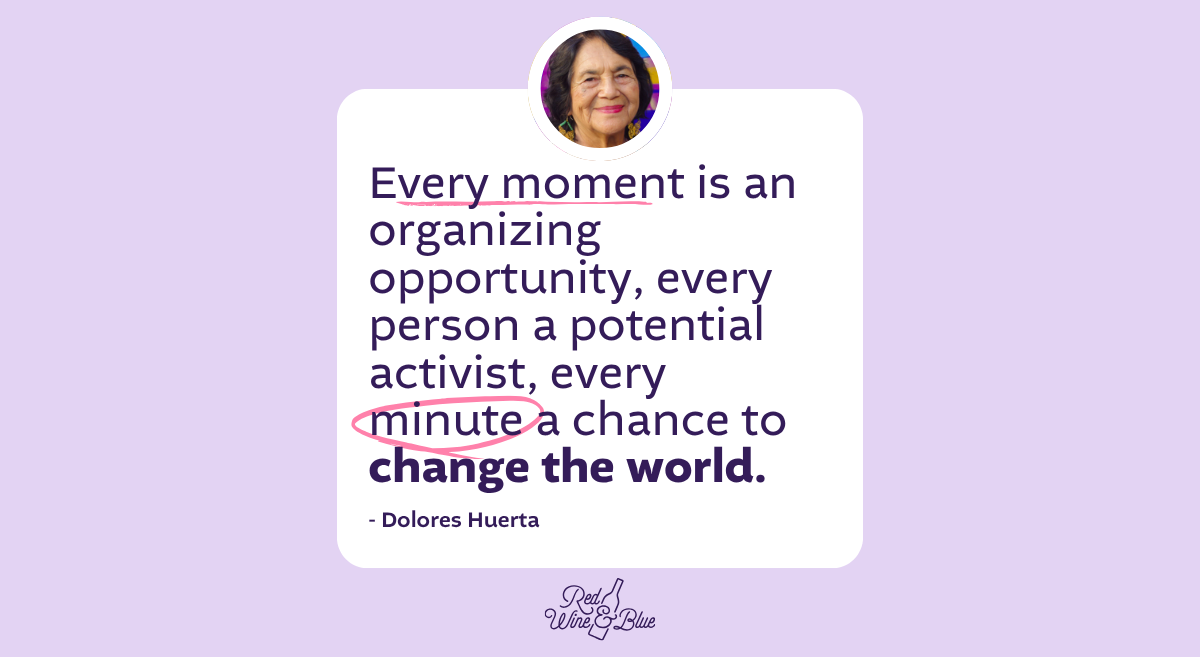Throughout history, women have organized and fought for the greater good. Right now, as we witness great injustices and many of our freedoms are at stake, let’s recognize and celebrate some of the American women who showed us what’s possible through local organizing.
Esther de Berdt Reed
In 1780, Esther de Berdt Reed formed the Ladies Association of Philadelphia to support soldiers in the Revolutionary War. She organized dozens of women to go door-to-door raising more than $300,000 from 1,600 individuals! Working with George and Martha Washington to decide how to use the money, the women purchased linen and made much-needed new shirts for the soldiers in the field. Their efforts became a standard for combining social and political activity for good causes in other states.
Harriet Tubman
Harriet Tubman was born into slavery in Maryland. In 1849 she escaped and made it to freedom in Philadelphia, but her family stayed behind. She decided to return to help them and became a “conductor” of the Underground Railroad, building a personal network of abolitionist friends and helpers. In 1854, she succeeded in helping her parents, brothers, and others escape to freedom. In total, she made about 13 trips, helping an estimated 70 people reach freedom in the north.
Ella Baker
Ella Baker, the Executive Secretary for the Southern Christian Leadership Conference (SCLC), was impressed by the student sit-ins during the Civil Rights movement. In 1960, she organized a conference to bring all the student leaders of the sit-in movement together. There, she encouraged the 126 students in attendance to create the Student Nonviolent Coordinating Committee (SNCC). She connected them with each other and with powerful leaders from the NAACP and SCLC. Many Civil Rights leaders grew out of the SNCC and the organization went on to become an important part of the movement.
Dolores Huerta
Dolores Huerta grew up in an agricultural community of diverse, working families in California. As a teacher, she was bothered by the economic injustices faced by her students. This led her to become an organizer with the Stockton Community Service Organization and to found the Agricultural Workers Association. She arranged voter registration drives and advocated for workers’ rights. That’s how she met César E. Chávez and together, in 1962, they started the National Farm Workers Association to help farm workers organize, negotiate for better work contracts and insurance, and secure aid and safer working conditions. At 95 years old, Dolores still travels the country helping working families organize and advocate for themselves.
Heather Booth
Heather Booth was already active in civil rights causes in 1965, before Roe v. Wade, when she formed JANE, a secret abortion service. She organized ten women and even more anonymous volunteers to run JANE. For seven years they helped 11,000 patients get the safe healthcare they needed. Heather never stopped organizing and also founded Midwest Academy, which trains grassroots organizers on how to successfully make positive change in their communities.
Ai-jen Poo
Ai-jen Poo is the daughter of immigrants who volunteered in an Asian women’s shelter and saw the struggles faced by domestic care workers — low pay without benefits, overwork, and workplace violence. She started a campaign to organize domestic workers — mostly immigrants — through the Committee Against Anti-Asian Violence (CAAAV): Organizing Asian Communities. She did true grassroots work, visiting playgrounds, parks, and churches to connect with workers. Since then, through founding other organizations, Ai-jen has continued to fight for better resident care in nursing homes and for improved working conditions for caregivers and domestic workers.
Patrisse Cullors, Alicia Garza, and Opal Tometi
In 2013, George Zimmerman was acquitted of killing 17-year-old Trayvon Martin in Florida. This sparked the creation of the #BlackLivesMatter movement by Patrisse Cullors, Alicia Garza, and Opal Tometi. A year later, after Mike Brown was murdered in Ferguson, MO, the movement spread with more than 600 people gathering in St. Louis to protest. From there, these organizers were determined to help any communities fighting violence against Black people. Initially spreading to 18 more cities, #BlackLivesMatter is now a global movement with a network of support for leaders making a difference in their communities.
All of these women saw an issue they cared deeply about and set out to fix it. And this is obviously a non-exhaustive list! There are countless other women – sung and unsung — who have organized in big and small ways to make a positive difference in their communities and in the lives of others. We are so inspired by all these women and hope you are too!


